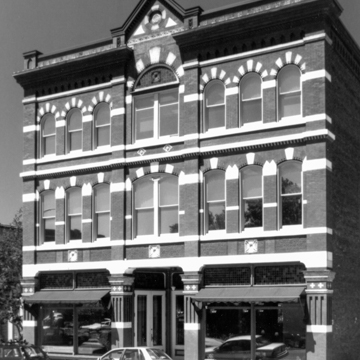At the time of its construction, the Beckwith Block was regarded as the finest commercial building in the county, if not in the entire state. Its decoratively textured and polychrome paneled facade with insets of marble and terra-cotta, molded bricks, and expansive display windows with stained glass transoms emulated contemporary buildings in New York City and Boston, both cities that the architect had recently visited. This emporium for dry goods and groceries introduced a High Victorian scale and vigor to downtown Middlebury in an era when commercial structures took on a prestige formerly reserved for public and religious buildings. The Beckwith Block was soon rivaled by a new courthouse and a town hall also designed by Clinton G. Smith and built by his firm, Smith and Allen. Taken together this trio transformed the character of the formerly Federal Middlebury green.
You are here
Beckwith Block
1882–1883, Clinton G. Smith; 1997 restoration, Arnold and Scangas. 22–26 Main St. Middlebury village
If SAH Archipedia has been useful to you, please consider supporting it.
SAH Archipedia tells the story of the United States through its buildings, landscapes, and cities. This freely available resource empowers the public with authoritative knowledge that deepens their understanding and appreciation of the built environment. But the Society of Architectural Historians, which created SAH Archipedia with University of Virginia Press, needs your support to maintain the high-caliber research, writing, photography, cartography, editing, design, and programming that make SAH Archipedia a trusted online resource available to all who value the history of place, heritage tourism, and learning.















